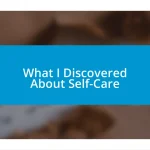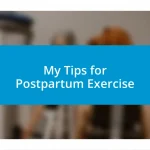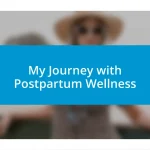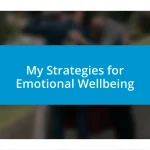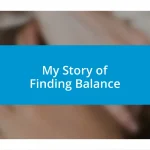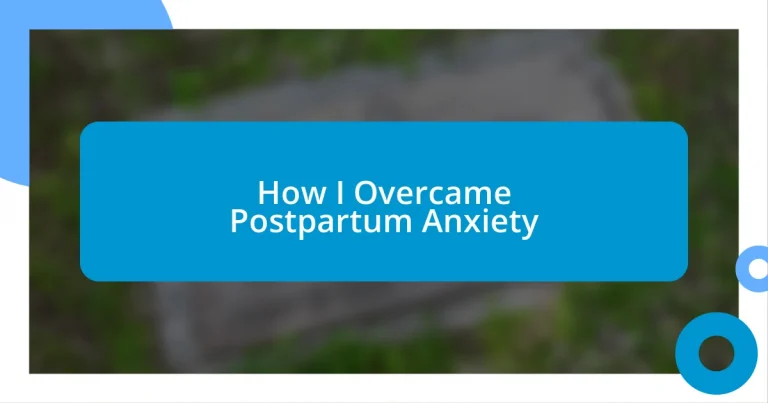Key takeaways:
- Postpartum anxiety can manifest as persistent worry and physical symptoms, making it essential to recognize signs and seek support.
- Seeking professional help and openly discussing experiences with healthcare providers reinforces that mothers are not alone and can receive tailored guidance.
- Building a support network and practicing mindfulness can significantly alleviate anxiety and enhance overall well-being during the challenges of motherhood.
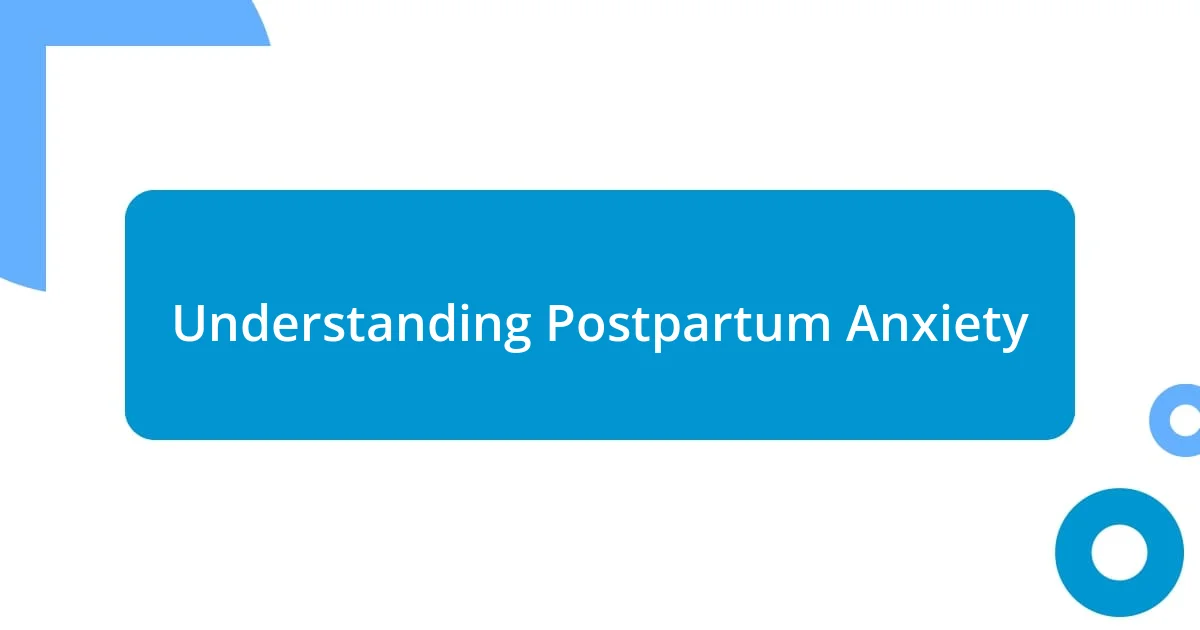
Understanding Postpartum Anxiety
Postpartum anxiety is more than just the baby blues; it’s a profound sense of dread and worry that can overshadow the joy of new motherhood. I remember feeling a tight knot in my stomach every time my baby cried, as if I were carrying the weight of the world on my shoulders. Was I doing enough? These questions spun in my mind, amplifying my anxiety.
What’s particularly distressing is that postpartum anxiety often sneaks up on you, cloaked in everyday worries. One moment, I was excited about my baby’s milestones, and the next, I was paralyzed by fear of something terrible happening. This constant cycle of anxiety can make it hard to find joy in small moments, and it’s easy to feel isolated in your experience.
I’ve learned that recognizing the signs is the first step toward understanding this condition. It’s not just about feeling overwhelmed; it can manifest in physical symptoms, too—like racing heartbeats or trouble sleeping. Have you experienced these feelings? If so, know that you’re not alone, and it’s crucial to seek support and information.
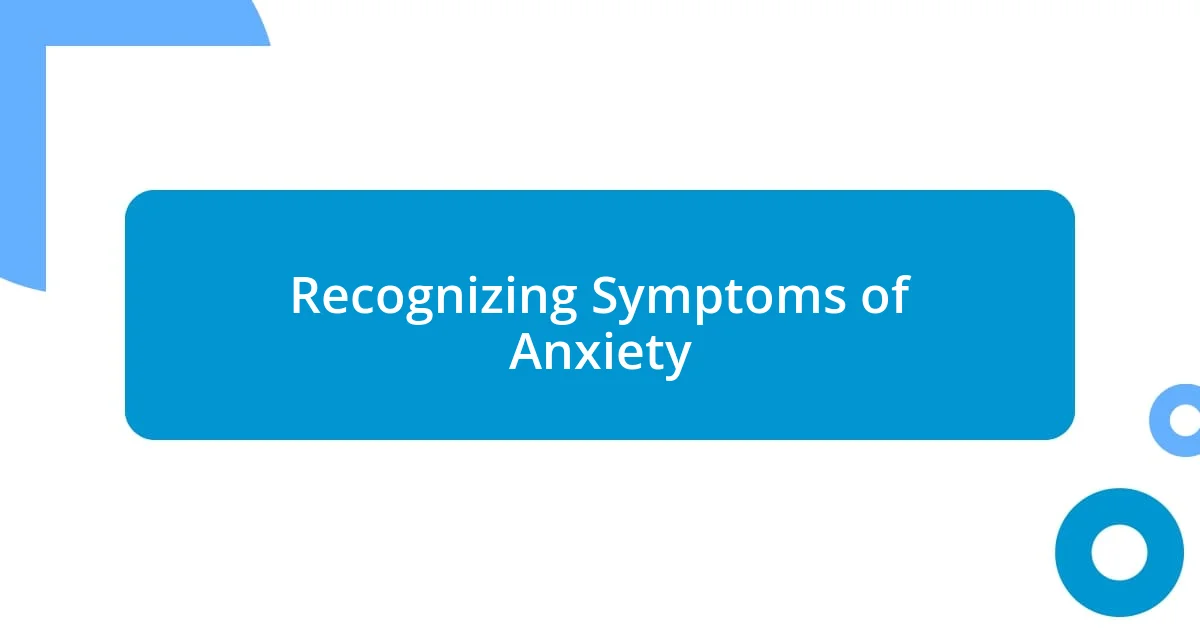
Recognizing Symptoms of Anxiety
Recognizing anxiety can feel overwhelming, especially when you’re immersed in the whirlwind of new motherhood. Sometimes, I found myself lying awake at night, fixated on every little sound my baby made. It was as if my mind was on a relentless hamster wheel, cycling through worries of whether I was being a good parent. The nagging voice in my head would remind me of possible dangers, amplifying my sense of dread.
Here are some key symptoms I’ve learned to recognize in myself and others:
- Persistent Worry: An ongoing feeling of fear that something bad will happen.
- Physical Symptoms: Experiencing racing heartbeats, headaches, or gastrointestinal issues.
- Sleep Disturbances: Difficulty falling or staying asleep, even when exhausted.
- Irritability: Feeling easily overwhelmed or irritated, often over small issues.
- Avoidance: Steering clear of situations that trigger anxious thoughts, even if they are related to your baby.
Understanding these signs can empower you to seek help or take small steps towards alleviating those feelings. It has made a meaningful difference in my journey, helping me recognize when I needed to pause and gather myself.
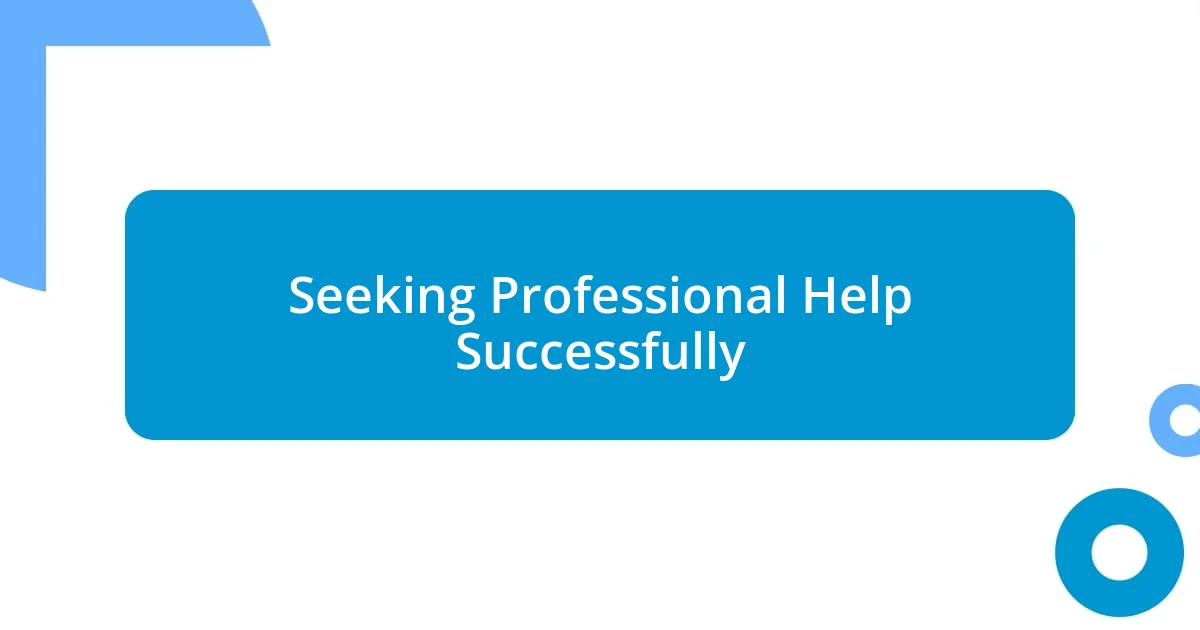
Seeking Professional Help Successfully
Reaching out for professional help was one of the most significant steps I took in managing my postpartum anxiety. Initially, I hesitated, thinking I could handle everything on my own. But when the anxiety intensified—making even daily activities feel insurmountable—I realized I needed guidance. Finding a therapist who specialized in postpartum issues provided me with a safe space to process my feelings. I remember the first session where I shared my worries about motherhood; it was a relief to voice those fears out loud and feel validation in return.
One vital part of seeking help was openly discussing my experience with my healthcare provider. I learned that they could offer resources and recommend therapists. I had always feared that speaking up might mean I was a bad mother, but instead, I found support and understanding. Sharing my story helped lift a weight off my shoulders, as I realized that professionals are there to guide you, not judge you. Have you ever felt that relief when someone finally understands what you’re experiencing?
| Steps to Seek Professional Help | Personal Insights |
|---|---|
| 1. Acknowledge the Need | It took me time to admit I needed help, but once I did, the sense of relief was immediate. |
| 2. Research Qualified Professionals | Finding someone who understands postpartum issues was crucial; it felt empowering to have tailored support. |
| 3. Be Open and Honest During Sessions | Vulnerability in therapy led to breakthroughs, helping me understand my emotions better. |
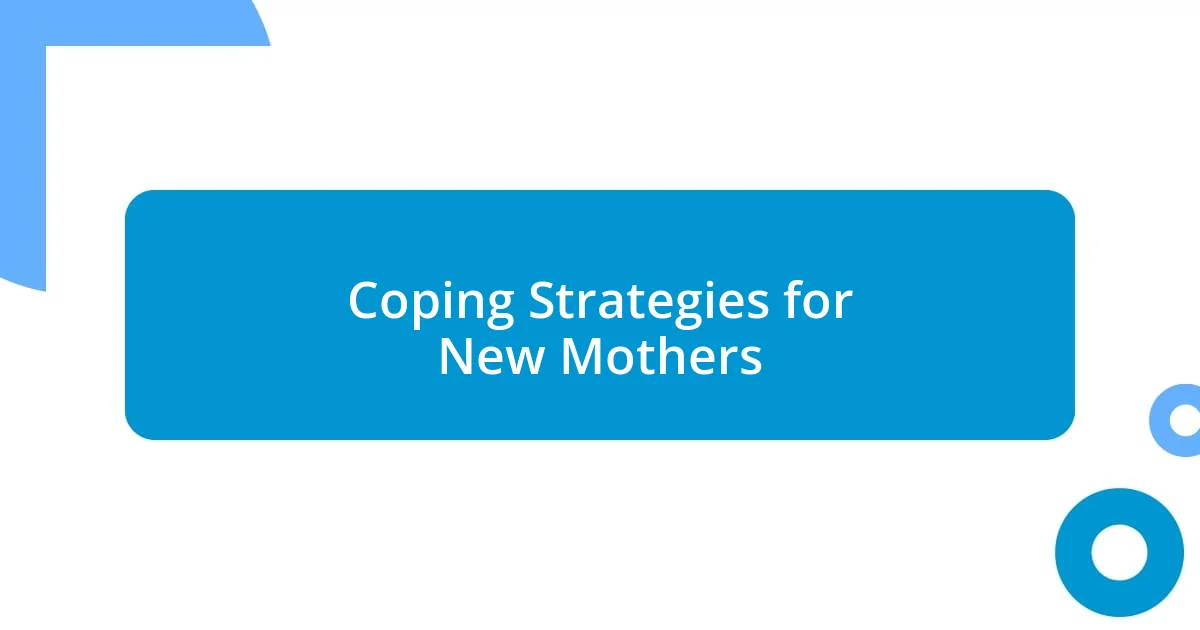
Coping Strategies for New Mothers
One of the most effective coping strategies I found was prioritizing self-care moments throughout my day. Even a brief five-minute break, where I could savor a cup of tea or step outside for fresh air, transformed my mindset. I learned that it wasn’t selfish to take a moment for myself; rather, it was essential for my mental well-being as a new mother. Have you ever noticed how even a small act of kindness towards yourself can create ripples of positivity in your day?
Connecting with other mothers became my lifeline. I remember joining a local moms’ group, which offered me a community where I could share my experiences and hear others’ stories. The honest conversations built bridges of understanding and support, helping to affirm that I wasn’t alone in facing these challenges. During those gatherings, I realized we all carried similar fears and triumphs; what a relief to exchange those realities with others just as sleep-deprived and anxious as I was!
Mindfulness and breathing exercises were game-changers for me. Each time I felt panic rising, taking a few deep breaths brought me back to the present moment. I vividly recall a particularly stressful evening when I practiced a simple breathing technique I had learned: inhale for four counts, pause for four, and exhale for four. It grounded me, allowing the chaos to fade momentarily. I often wonder—what if more new mothers embraced these simple practices? Would we find ourselves feeling a little lighter through the storm?
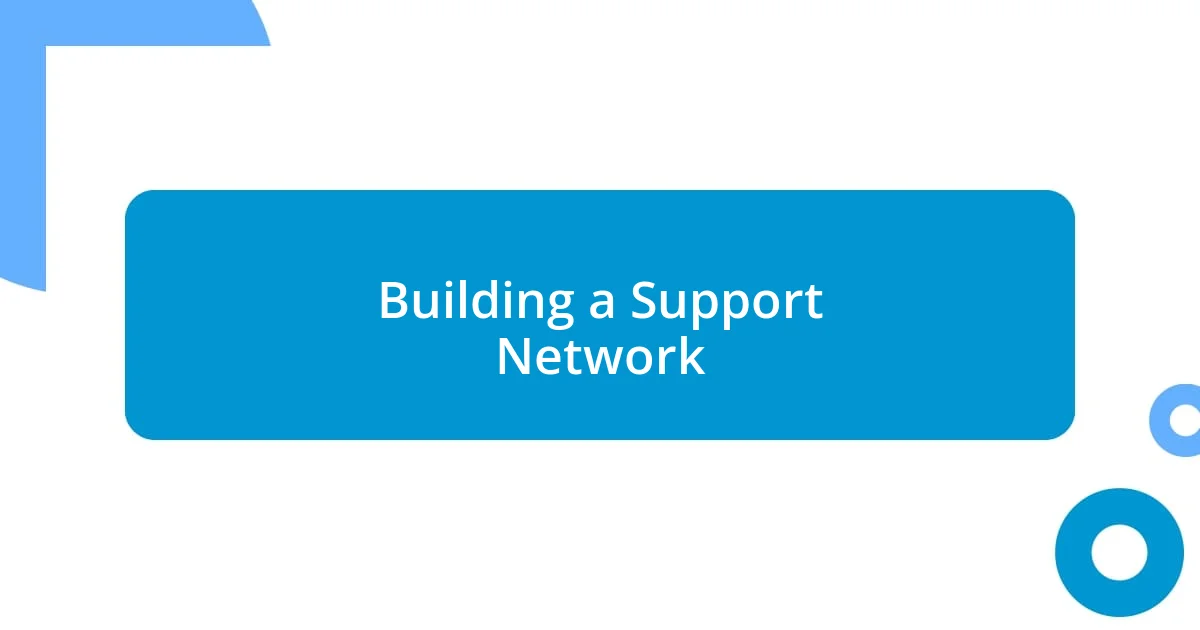
Building a Support Network
Building a support network was instrumental in my journey through postpartum anxiety. I remember feeling isolated at first, thinking that nobody could understand what I was going through. But when I sought out friends and family who had experienced similar challenges, a weight lifted from my shoulders. It became clear that sharing my struggles, even in casual conversations, made me feel more connected and less alone. Can you recall a time when a friend’s shared experience transformed your perspective?
Joining online parenting communities also played a pivotal role. I was amazed by the depth of understanding and empathy I found in these virtual spaces. This interaction provided me with a sense of camaraderie, even if we were miles apart. There was an incredible comfort in knowing that during those late-night feedings and constant worries, others were awake and sharing in those same sentiments. Have you ever felt that instant connection with someone through shared experiences?
Ultimately, building a network gave me access to practical advice and emotional support. For instance, I learned about local workshops and resources tailored for new mothers, which proved invaluable. Through these connections, I not only received encouragement but also practical tips that made everyday challenges feel more manageable. Reflecting on my experience, I often ask myself: what if every new mother had the resources and people to lean on during such a transformative time? Wouldn’t it make the journey a little easier for all of us?
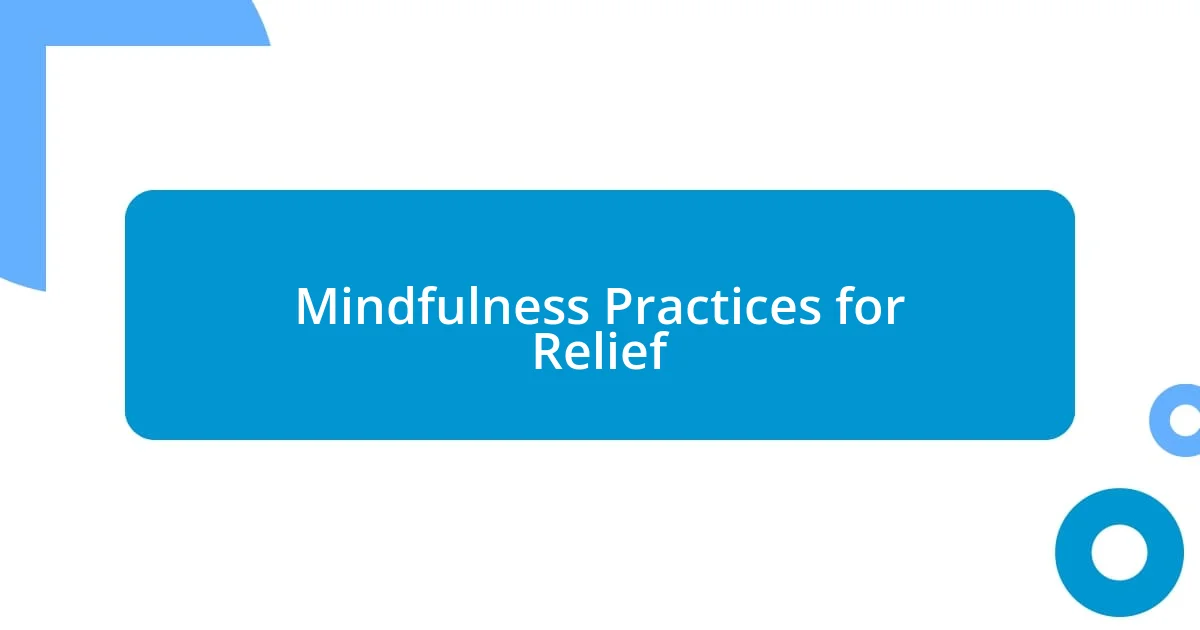
Mindfulness Practices for Relief
Practicing mindfulness became my refuge during overwhelming moments. One particular afternoon, while the baby napped, I found myself on a quiet balcony, closing my eyes and tuning in to the sounds around me. The whispers of the wind and the distant laughter of children felt like a gentle reminder that life continued outside my worries. Isn’t it fascinating how immersing yourself in the present can dissolve anxiety, even if just for a moment?
I also discovered the profound impact of guided imagery. In those hectic days filled with diaper changes and sleepless nights, I would escape to a serene beach in my mind. Imagining the sun on my skin and the rhythmic lapping of waves brought an unexpected sense of peace. It made me wonder: what if we all created our mental sanctuaries? Could this be a tool for reducing anxiety during challenging parenting days?
Incorporating mindful movement, like gentle yoga, into my routine was another breakthrough. I’ll never forget one particular session where I focused on my breath with each stretch and pose. As I let go of tension, I felt a weight lift from not just my body, but my mind too. Have you ever noticed how connecting movement with breath can spark a sense of clarity? It’s almost like a reset button, allowing me to face the day anew, filled with hope rather than worry.
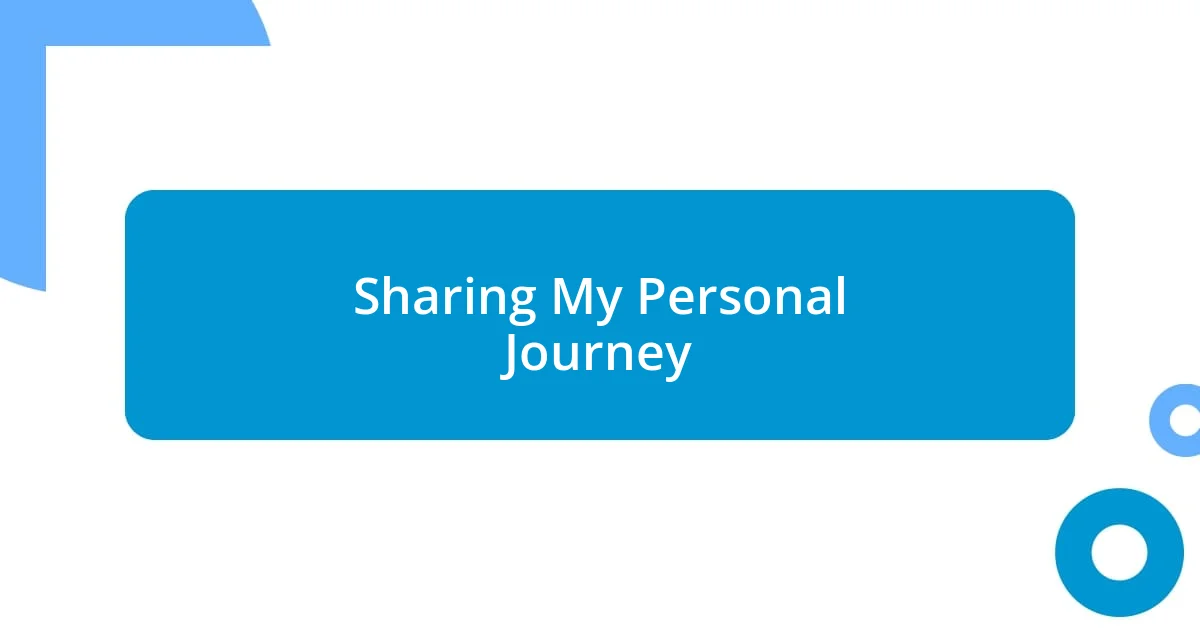
Sharing My Personal Journey
Sharing my personal journey through postpartum anxiety was a humbling experience. I vividly remember the first time I opened up to a close friend about my struggles. As I spoke, tears streamed down my face, and I felt a sense of vulnerability I hadn’t anticipated. But what surprised me most was her reaction — she didn’t just listen; she shared her own battle with anxiety, making me realize how powerful it can be to connect through shared experiences. Have you ever poured your heart out to someone, only to discover they’re fighting a similar battle?
As time went on, I began to explore deeper aspects of my feelings. I often felt like I was on a rollercoaster of emotions — one moment feeling immense joy from my baby’s smile and the next drowning in the weight of worry. I had nights where sleep eluded me, and during those dark hours, I would journal my thoughts. Writing became a gentle release, helping me process my feelings and track my progress. Is there something you’ve found that helps you articulate your emotions, even during the toughest moments?
I took a courageous step to attend a local support group, and it changed everything. Sitting in a room full of mothers who shared their honest stories was a revelation. There was laughter amidst the tears, and I had a newfound appreciation for the community we were building together. I also found a strange but comforting solace in discussing my struggles, which reminded me of the strength found in vulnerability. What if every new mother could find a safe space to share? I believe it could be a crucial step toward healing.



